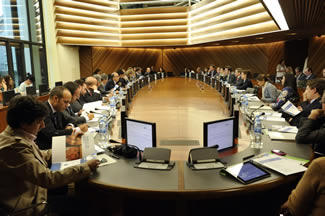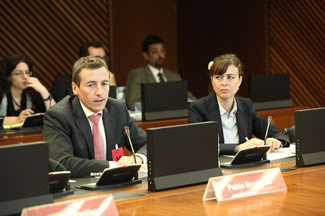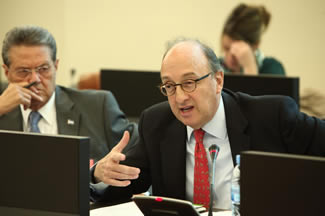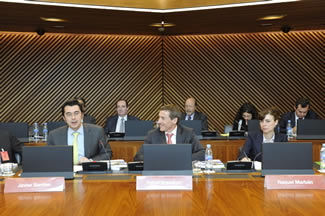CAF presents its 2013 RED in Madrid, focused on entrepreneurship in Latin America
CAF's report assures that Latin America presents a high rate of entrepreneurs, although few have innovative and transformative business ideas.
To change this trend, CAF promotes new support policies for entrepreneurs.
(Madrid, April 24th, 2014). CAF, Development Bank of Latin America, presented the ninth edition of its Report on Economy and Development (RED 2013) calledEntrepreneurships in Latin America. From subsistence towards productive transformation.On this occasion, the report highlighted the entrepreneurship figures for Latin America, analyzing official data, but also the answers to a survey carried out in 17 cities of the region.
Guillermo Fernandez de Soto, CAF's Director Representative in Europe highlighted the importance of this report during his intervention in the presentation, in order to understand the situation of entrepreneurs in the region while thanking the Bank of Spain, represented in this act by its Director of International Affairs, Pilar L´Hotellerie, for their support in carrying out this reflection seminar.
The document presented by Pablo Brassiolo, CAF Economist and one of the study's researchers, states that Latin America has a high entrepreneurship rate: one out of every three workers starts a business. However, almost 90 percent are individual entrepreneurships; of those who hire workers, only 25 percent has more than five employees. These are businesses that result from the lack of working opportunities in the salaried sector, and do not have enough potential to turn into a transformative company. In fact, according to the report, the few companies that do succeed with this revitalizing characteristic cannot fully develop, partly because they cannot find workers with the required capacities because they are taking refuge in self-employment, losing skills that are useful for the dynamic segment of the economy.
Brassiolo assured that, "the abundance of very small companies and the relative scarcity of medium and large companies lead the region to a cycle of low productivity and informality in employment creation. The idea of the report is to contribute to promote new policies that try to break this vicious circle".
CAF's more recent content

CAF, ECLAC, IDB and PAHO Promote Sustainable Development in the G20
The Regional Organizations of the Americas congratulate Brazil on its successful G20 Presidency, highlighting its leadership on key issues such as poverty, governance, and climate change. They also reaffirm their commitment to actions that promote equity and development in the region.
Urgent Call for Action to Safeguard Caribbean SIDS at CAF Symposium
As the global community grapples with the escalating climate crisis, Caribbean Small Island Developing States (SIDS) are running out of time to secure critical investments and support needed to strengthen their economies and protect vulnerable communities from the intensifying impacts of climate change. With the window to take decisive action rapidly shrinking, CAF - Development Bank of Latin America and the Caribbean, in partnership with the Commonwealth Secretariat and the Antigua and Barbuda High Commission, brought together key stakeholders for a symposium in London to address the critical vulnerabilities Caribbean SIDS face.



